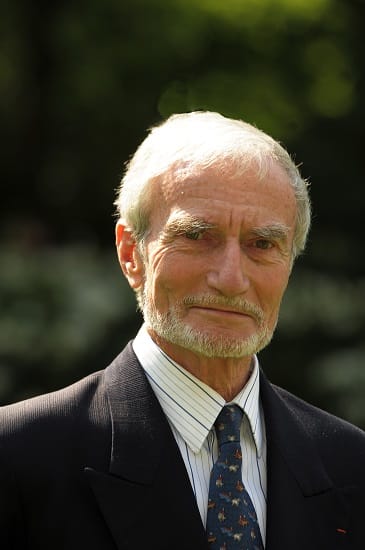At 77 years of age, Bernard Majoie is as active as ever. As founder of the Fournier-Majoie Foundation, he dedicates his time to the battle against cancer. His philanthropic foundation provides funding and guidance to multiple research projects and companies who are combating cancer by developing new and improved cancer diagnostics. Majoie employs a unique strategy: the supported projects complement each other and work together creating an exceptional successful microclimate. We sat down with the man behind the foundation to ask how it all started.
“I started my career as a pharmacist, with a PhD in pharmacology, dedicated to the university as a researcher and teacher. When I was invited to run a trial in a small company close to Dijon, France, my life changed quite drastically. Apparently the family Le Lous – succeeding the founding Fournier family and the owners of the company at the time – liked my approach and they asked me to build their research center. A couple of decades later, I was the CEO of that same company. When the family decided to sell the company in 1999 to Abbott, I decided it was time to move on. After the trade sale (2005) I reinvested part of the capital I made into a few biotech companies and created the ‘Fournier-Majoie’ foundation a few years later. The name of course, refers to the FOURNIER TEAM I built and had some significant success with; I am very grateful for the opportunities they have offered me!
Qui veut, peut
The Fournier company was founded in 1881 as a simple pharmacy and later grew to include a laboratory. Over the 35 years Majoie was in charge, the Fournier laboratories grew rapidly; from 100 employees in 1965, to 4400 when he left the company. The company became well-known for two products: Urgo band aids (yes, the plasters sold all over the world), and a beverage enriched with vitamin B12 from black currant extracts. While much of its success is to his credit, Majoie remains modest.
“I am not an exceptional man. Many others in my position would have been able to do this. Today, I try to explain researchers and entrepreneurs that they too can make a difference. It only requires the will to act. When I was twelve years old, I visited a castle of which the motto was: “Qui veut, peut”, he who wants, can. The Obama slogan “Yes, we can” avant-la-lettre. I adopted it as my own and have lived by it ever since. It is the essence of what I wish to communicate and emulate.”
Pushing discovery into development
Today I focus on projects that have already found an answer to their initial research questions and a team that is looking to take their innovations to the next level. I tend to focus on R&D projects that improve cancer diagnosis and prognosis. Cancer continues to be a terrible killer and the lack of treatment options for patients at later stages is frustrating. By working to improve our ability to diagnose these patients, it will improve our ability to identify the most appropriate treatment for each person.
The minimum we require from a candidate applying for one of our grants is to bring a first verification of their hypothesis. For example, they need to present a marker as a diagnostic candidate, the rationale behind it, and some preliminary data from the lab confirming the feasibility. Our organization provides much more than a check. We help them to focus, ask the right questions and bring their project closer to the clinic. The foundation wants to encourage researchers to become entrepreneurs and to envision the development of their discoveries into an end product. The many connections I have established in R&D and the industrial and clinical area can help the laureates in the exploitation of their discoveries, through licensing or building a startup.
If our laureates are successful, they must return the favor: once a product or service is generating revenue, a part of the revenue will come back to the foundation. Beneficiaries learn to value philanthropy and the foundation can continue to grow and fund new projects. We call this the virtuous circle.”
The strength of a network
Since 2007, the Fournier-Majoie Foundation has financed 8 academic projects, including research into biomarkers for liver, colorectal, prostate and kidney cancer. At first glance these projects might seem independent, but the people and companies involved support each other and form a tight network.
“Our first laureate was Nico Callewaert from VIB/UGent. The research group had developed a test for the early prediction of fibrosis and later on of cirrhosis, an important risk factor for liver cancer. A more recent project is that of Jo Vandesompele, with the search for a neuroblastoma classifier. Neuroblastoma is a very rare disease, with only 15-20 new cases each year in Belgium, but is very difficult to treat and severely impacts the quality of life of the children it affects. Patients need to be stratified in classes based on severity of their disease to determine which treatment is most appropriate. The research of Jo Vandesompele has allowed us to make a distinction between high-risk and extremely high-risk patients, which allows physicians to avoid giving aggressive treatment to patients who would not necessarily benefit from it.
Jo Vandesompele is also active in the spin-off company Biogazelle, which has specialized in qPCR and mi/lncRNA technologies and its potential for drug development. Biogazelle also received a grant from our foundation and acts as a service company for the other projects the foundation supports. This creates an interactive network of companies who support each other and work together with academia. The different teams help each other grow and aid in the development of new projects. This is an important added value to the entire biotech community.
The last call for projects dates from 2013. We foresee to launch a new call in 2016.”


